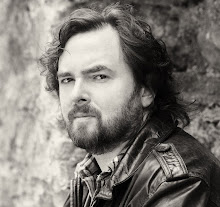Friday night past was one of the best evenings I've had for a very long time. Due to a string of coincidences and a special alignment of the planets, my agent Nat Sobel and his lovely wife Judith Weber happened to be in Belfast on the same day that
Colin Bateman launched his latest novel, MYSTERY MAN, at
No Alibis on Botanic Avenue. Nat and Judith had been touring Ireland for most of the previous two weeks, driving almost the entirety of its coastline from Dublin to the south, then up the west coast to the north. Unfortunately it rained constantly, but again due to sheer blind luck, the skies cleared for their visit to Belfast.
I met Nat and Judith at the
Crown Liquor Saloon, opposite the Europa Hotel (Europe's most bombed hotel, fact fans) on Great Victoria Street. The Crown is a Belfast landmark and a must-see for anyone visiting the city, and after a quick drink there we strolled towards Botanic Avenue and No Alibis while we talked about the city and its recent history.
We were welcomed at No Alibis by its excellent proprietor, David Torrans, and the man himself, Colin Bateman. This was the first time Colin and I had met in person, and I'm happy to report he's a thoroughly nice chap, even if he has an irrational aversion to jazz. The reading was a resounding success with the shop filled to bursting. And who says humour doesn't travel? Nat and Judith, both native New Yorkers, just about bust a gut laughing with the rest of us at Colin's unique brand of Ulster comedy. Comedy is, of course, one of the hardest things to pull off in a novel, but Mr. Bateman showed us all how it was done, and his delivery in front of an audience is something to behold if you ever get the chance. Although Colin Bateman is easily Northern Ireland's most successful novelist, and he's a big name throughout Europe, his profile in the USA isn't high. With MYSTERY MAN being
picked up by Richard & Judy for the summer season, I think that could be about to change; my American friends, keep your eye out for this book.
Another coincidence is that Mystery Man is in fact set in a crime bookshop on Botanic Avenue called No Alibis. David Torrans is absolutely insistent that the novel's narrator is not him. Regardless, I know David and his fantastic independent bookshop left a big impression on Nat and Judith, especially the great success he'd made of the reading. Nat was truly delighted to see not only an independent bookshop thriving in such turbulent times, but also the great support of the people of Belfast. He positively marveled at the turnout, and the queues of fans waiting for Mr. Bateman to sign their books. So well done to David Torrans and all at No Alibis - it takes some doing to wow a hardened publishing veteran like Nat Sobel, but you certainly did it. Roll on the 15th of May when American thriller scribe
Michael Connelly comes to town, which will be another triumph for David.
After the event, Nat and Judith departed for their hotel. I stayed on at No Alibis to get a pint and a catch-up with the man behind
Crime Scene NI, Gerard Brennan. To my delight it turned out that
John Connolly also happened to be in the audience, so the evening wound up with John, Colin, Gerard, David and I heading out for dinner and drinks. Good food, good beer and good company; our conversation was polite and wholesome and involved absolutely no dirty jokes or swearing. Honest. *cough*
And finally...
I'm just a couple of entries away from my 200th blog post and I'd like to make it a special occasion. As I've previously posted, I have in my possession an advance copy of James Ellroy's latest, BLOOD'S A ROVER. So for my 200th post, I'm going to write a special essay about the new book (over and above a straight review, which I hope to supply to the aforementioned Gerard Brennan when I've finished reading it). What I will say for now is that Blood's a Rover is a most surprising novel. I had wondered if it would be closer in style to AMERICAN TABLOID or THE COLD SIX THOUSAND, and on first impression it was the former. But as I sink deeper into Ellroy's intoxicating murk, I'm beginning to realise it's like neither. It marks a departure for Ellroy in many ways, but the greatest is its tenderness; don't worry, Ellroy hasn't gone soppy on us, but where I am now in the book, it's exhibiting something his previous works could be described as lacking: a human heart.
Oh, and here's little tidbit for Ellroy fans: after the upcoming memoir focusing on Ellroy's relationships with women (apparently turned in hot on the heels of BLOOD'S A ROVER), his next work of fiction will travel back in time to 1948 Los Angeles and feature a certain Irish cop who loomed large over THE BIG NOWHERE, LA CONFIDENTIAL and WHITE JAZZ...
Labels: belfast, blood's a rover, colin bateman, friends, gerard brennan, james ellroy, john connolly, life, Nat Sobel, no alibis





